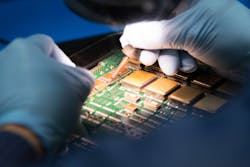Army chooses BAE Systems to design next-generation radiation-hardened microelectronics components for space
ROCK ISLAND ARSENAL, Ill. – U.S. Army microelectronics experts needed a company to develop next-generation radiation-hardened microelectronics components for military and space applications. They found their solution from the BAE Systems Electronic Systems segment in Merrimack, N.H.
Officials of the U.S. Army Contracting Command at Rock Island Arsenal, Ill., have announced a $60 million contract to develop certain types of next-generation, radiation hardened by design (RHBD) microelectronics leveraging Intel Corporation's commercial foundry, Intel Foundry Services.
The main goal of the program is to expand onshore access to state-of-the-art microelectronics technology for the United States government and aerospace community, BAE Systems officials say.
This type of technology is available today through limited sources in the U.S, which can lead to supply chain challenges and time lags for the delivery of next-generation microelectronics for space.
With this contract, the BAE Systems FAST Labs research organization will harness Intel's commercial foundry process to build a new design library to develop advanced high-reliability microelectronics and expand the domestic supply of this technology for the defense and aerospace community.
"Leveraging Intel's commercial foundry to manufacture this technology can speed up the production of next-generation technology and help resolve supply chain challenges so we can maintain our country's technological edge," says Chris Rappa, director at BAE Systems FAST Labs.
This award enables U.S. defense and aerospace companies to access advanced processes for developing application-specific integrated circuits (ASICs). Currently, development of RHBD ASICs uses a 45-nanometer process, but with this contract there is potential to deploy more advanced technology nodes and enable more functionality and faster processing in smaller areas, at lower power.
Related: The evolving world of radiation-hardened electronics for space
In addition to working with Intel Foundry Services, BAE Systems will execute on this program through collaboration with a team composed of Cadence Design Systems, Carnegie Mellon University, Movellus, Reliable MicroSystems, and Sandia National Laboratories.
This work builds on the company's longstanding heritage of delivering electronics capable of successfully completing missions in the most challenging environments. BAE Systems will perform work on the program at its facilities in Merrimack, N.H. and Manassas, Va.
For more information contact BAE Systems Electronic Systems online at www.baesystems.com, or the Army Contracting Command at Rock Island Arsenal at https://acc.army.mil/contractingcenters/acc_ri.